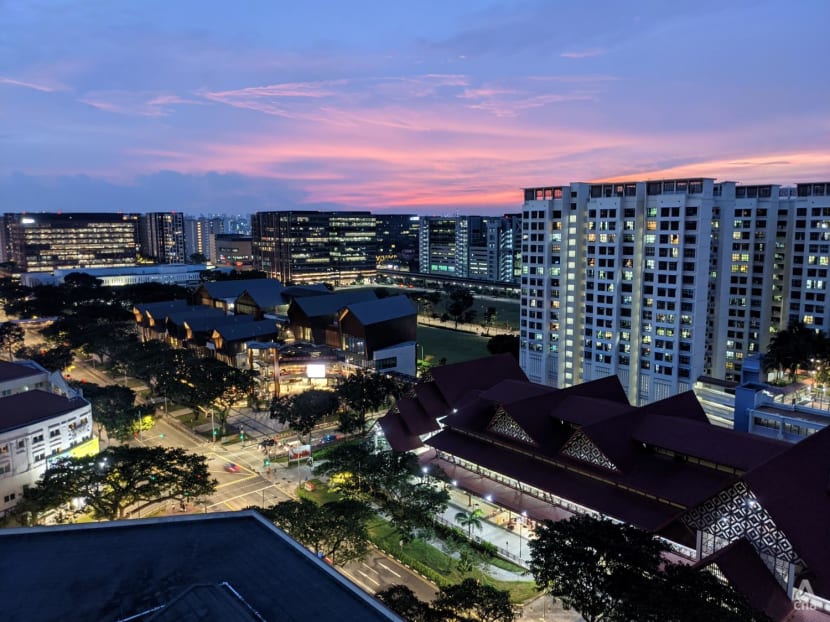'Not tenable' for Government to subsidise electricity consumption, says Tan See Leng

Geylang Serai at dusk on Aug 2, 2021. (Photo: Try Sutrisno Foo)
SINGAPORE: It is "not tenable" for the Government to subsidise electricity consumption in Singapore, Second Minister for Trade and Industry Tan See Leng told Parliament on Monday (Apr 4), adding that this keeps domestic electricity prices lower than the global energy prices Singapore must pay for in the first place.
"The Government can and will help to smooth out extreme fluctuations in energy prices, but over the longer term, electricity prices have to reflect the costs of procurement and production," he said in a ministerial statement on inflation and business costs.
This comes as the price of oil and gas remains elevated due to factors like increased consumption, upstream production issues and the war in Ukraine, he said, warning that consumers should be mentally prepared to face higher electricity bills over time.
SP Group announced last week that it would raise regulated tariff rates for its consumers by about 10 per cent, while those on retail contracts have already started to see higher electricity prices when renewing their contracts.
Nevertheless, Dr Tan said the protracted energy crunch has highlighted the need to make Singapore's power system more resilient and less susceptible to fuel supply shocks, by diversifying the country's fuel and energy sources.
"These measures will take time to bear fruit, but we will have a more secure and a more resilient power system over time," Dr Tan said.
As for measures for consumers, MP Gerald Giam (WP-Aljunied) asked if the Government will consider a special additional tranche of U-Save rebates to help them cope with the price hike.
Finance Minister Lawrence Wong said existing schemes will cover S$600 worth of utility bills, or four months of these bills, for a household living in a four-room Housing Board flat, even after accounting for higher electricity prices.
"What happens subsequently, next half of the year ... what if electricity prices go up much higher? Well, we will as I've said continue to monitor the situation, assess the impact of what we have already announced and will implement, look at the global situation," he said.
"And as I've said just now, if the situation worsens, the Government will do more. But for now, let us roll out and properly implement all that's in the Budget already, which is already giving considerable support to households."
Dr Tan also urged consumers to do their part and "conserve energy, just like how we conserve water".
This includes small lifestyle adjustments such as switching off appliances that are not in use, raising the air-conditioning temperatures by 1 to 2 degrees Celsius, and using the fan instead of air-conditioning where possible.
These "can go a long way in maintaining a sustainable, secure and resilient energy future for all of us", Dr Tan said.
WHY ENERGY PRICES ARE RISING
Singapore generates around 95 per cent of its electricity domestically from imported natural gas, with electricity generation companies (gencos) generally relying on long-term piped natural gas (PNG) and liquefied natural gas (LNG) contracts to meet their needs.
"They use spot LNG on an opportunistic basis to supplement their long-term contracts," Dr Tan explained. "Now by and large, this has allowed us to keep electricity prices relatively stable and mitigate the impact of global price shocks."
Still, Singapore cannot fully insulate itself from volatilities in the global energy market, he said, pointing to a "confluence of factors" that caused the prices of oil and natural gas to spike, spilling over into Singapore's domestic energy market.
As major economies around the world emerged from the pandemic, they increased oil and gas consumption. This, coupled with seasonally-high energy consumption during the winter months in the northern hemisphere, and a series of unexpected gas production outages, led to a supply-demand mismatch in global energy markets.
Closer to home, upstream production issues in Indonesia’s West Natuna gas field and gas pressure issues from South Sumatra in the fourth quarter of 2021 caused disruptions to Singapore's PNG supplies. As a result, some gencos had to purchase more spot LNG at elevated global gas prices to make up for the drop in PNG supplies.
"Although some of the demand pressures have abated as winter in the northern hemisphere comes to an end, and upstream gas production issues in the Indonesian gas fields have been resolved, the gas supply situation continues to remain tight, and this is exacerbated and made protracted by the conflict in Ukraine," Dr Tan said.
MEASURES IN PLACE
The Ministry of Trade and Industry and the Energy Market Authority (EMA) have put in place measures to secure Singapore's electricity supply and maintain the orderly functioning of the wider energy sector, Dr Tan said.
Since October last year, authorities have established a Standby LNG facility, which gencos can draw from to generate electricity in the event of disruptions to their natural gas supplies.
"These measures bolster gencos’ existing stockpile and they provide additional layers of fuel security to cope with the short-term shocks to global gas supply," Dr Tan said.
Since January 2022, EMA has also been working with electricity retailers and generation companies to help large consumers secure retail contracts.
For example, businesses can secure one-month fixed price plans and retail contracts with significant fixed price components through the Temporary Electricity Contracting Support Scheme (TRECS).
So far, there has been sufficient supply under TRECS to meet demand, Dr Tan said.
"Given the uncertain global energy situation, EMA will be extending all measures, including TRECS, to end-June 2022," he added.
"This will give businesses, especially SMEs (small- and medium-sized enterprises), a bit more time to respond to the evolving global energy situation."
Dr Tan said EMA will continue to monitor the situation and consider extending the measures further or introduce new ones, if necessary.
MP Saktiandi Supaat (PAP-Bishan-Toa Payoh) asked about the possibility of introducing a lower-tier TRECS to support smaller SMEs, as these employ a "significant" number of locals.
Dr Tan replied that he feels the "same angst" for all the SMEs, but highlighted that the price differential for a lower-tier TRECS will have to be "subsidised by someone".
He added that if Mr Saktiandi is suggesting that the Government steps in to subsidise, "I think that it will be very difficult".
"Because electricity power consumption is one of those things that, how do you sort of subsidise that when people will just keep consuming more. So, I think that is the difficult part.
"So to the extent that is possible, what we have done is that we've continued to ensure stability, security, consistency of the supply."








